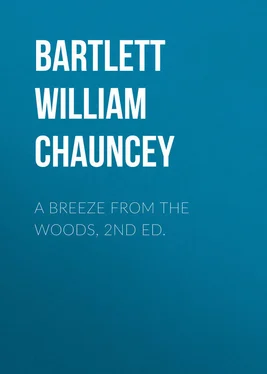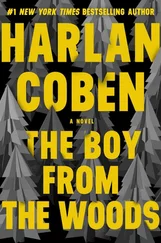William Bartlett - A Breeze from the Woods, 2nd Ed.
Здесь есть возможность читать онлайн «William Bartlett - A Breeze from the Woods, 2nd Ed.» — ознакомительный отрывок электронной книги совершенно бесплатно, а после прочтения отрывка купить полную версию. В некоторых случаях можно слушать аудио, скачать через торрент в формате fb2 и присутствует краткое содержание. Жанр: foreign_antique, foreign_prose, Путешествия и география, foreign_language, на английском языке. Описание произведения, (предисловие) а так же отзывы посетителей доступны на портале библиотеки ЛибКат.
- Название:A Breeze from the Woods, 2nd Ed.
- Автор:
- Жанр:
- Год:неизвестен
- ISBN:нет данных
- Рейтинг книги:4 / 5. Голосов: 1
-
Избранное:Добавить в избранное
- Отзывы:
-
Ваша оценка:
- 80
- 1
- 2
- 3
- 4
- 5
A Breeze from the Woods, 2nd Ed.: краткое содержание, описание и аннотация
Предлагаем к чтению аннотацию, описание, краткое содержание или предисловие (зависит от того, что написал сам автор книги «A Breeze from the Woods, 2nd Ed.»). Если вы не нашли необходимую информацию о книге — напишите в комментариях, мы постараемся отыскать её.
A Breeze from the Woods, 2nd Ed. — читать онлайн ознакомительный отрывок
Ниже представлен текст книги, разбитый по страницам. Система сохранения места последней прочитанной страницы, позволяет с удобством читать онлайн бесплатно книгу «A Breeze from the Woods, 2nd Ed.», без необходимости каждый раз заново искать на чём Вы остановились. Поставьте закладку, и сможете в любой момент перейти на страницу, на которой закончили чтение.
Интервал:
Закладка:
We shall need a regenerating fire some day, to do for books what is done for the forests. May it be a hot one when it comes. Let no dry sticks nor vermin escape. Ninety in every hundred books which have got into our libraries within the last half century, will fail to enlighten the world until there is one good, honest conflagration. Something might be gained from the ashes of these barren books; therefore, pile on the rubbish, and use the poker freely. Let not the fire go out until some cords of pious doggerel, concocted in the name of poetry, have been added thereto. The giants will survive the flames; but punk-wood, moths, and wood-ticks will all be gone.
By a noteworthy coincidence, when the smell of autumn fruits comes up from the valley, and the grapes hang in clusters on the hillsides, and wine-presses overflow, the last sign of dearth is obliterated by the swelling of all hidden fountains. The earth is not jubilant without water. The springs which had been lost, gurgle in the crevices of the rocks, and streaks of dampness are seen along the trails, where, in the early morning, little rivulets ran and interlaced and retired before the sun. There will be no rain for weeks. There has been none for months. The trees by the wayside faint and droop under the burden of heat and dust. But they know this signal of the coming rain. The fountains below seem to know, also, at what time the fountains above are to be unsealed; and these pulsing streams are the answering signal. Shorter days and diminished solar evaporation will answer as a partial clearing up of the mystery. But if the profoundest truth has not yet been touched, suppose, oh philosopher of many books and many doubts, that you let your grapnel into the depths for it? Only be sure that your line is long enough, and that you bring no more rubbish to the surface. There is more truth above ground than most of us will master. And we stumble over it in field and forest, like luckless treasure-hunters; when a ringing blow upon the dull rock would reveal filaments of gold, or the glancing light of crystals. There are some truths, also, whose insufferable light we cannot bear. They must be shaded off, like half tints at set of sun. And if any prophet coming out of the wilderness shall dare to tell more, let him eat his locusts and wild honey first, for he cannot tell whether he will be crowned or stoned.
A WEEK IN MENDOCINO
If one is in robust health and a vigorous trencher-man, who is there on the earth, in these degenerate times, to congratulate him on such good fortune? But no sooner is there a gastric revolt at the diabolical inventions of some high-priestess of the kitchen, with a growing cadaverousness, than every friend is ready with an ominous warning. When we publish a list of the patent medicines recommended, the world will know how many disinterested friends we have. Just now, the earth cure is all-potent. Try it in any shape you like – as a mud bath, a powder, a poultice, or an honest bed at mid-day – and this chemistry of earth and sun will work wonders. Are we not getting back to first principles? You talk of the shaking up which religious dogmas have suffered within the last half century: what is there of all the medical theories of the last fifteen hundred years which now goes unchallenged?
Yosemite has been a little overdone of late. The seashore and the springs are dreadfully haunted by the young lady in rustic hat, garnished with pea-green ribbon, and who either writes poetry, or reads the latest love story. There is comfort in the fact that the territory of this State is not more than half explored, and is not likely to be for some time to come. There are reaches equal to a degree of latitude untrodden, as yet, by the foot of the tourist, and where the clanking of the surveyor's chain and rods has never been heard; and some of these you may find within two hundred miles of San Francisco. Going still farther, there are vales where a white man was, till recently, something of a curiosity. It is interesting to find a country where morganatic marriages are in high repute. The red-headed lumberman's cross-cut saw would not, by this arrangement, descend to his children; nor would an old hunter's powder-horn and ancient rifle, by the same prudential forethought, be handed down to some little vagabond half-breeds.
In twenty-four hours one may be set down in the wildest part of Mendocino County. We selected Anderson Valley, on the headwaters of the Novarro River, not so much for its wildness as because it was the most accessible spot unfrequented by the tourist. It will be hard to miss the Russian River Valley in getting there, and harder still not to linger for a day or two to look at such pictures as no artist has quite succeeded in putting on to his canvas.
There was the mid-day repose of St. Helena, taking on a royal purple as the day advanced; the droning sound of the reapers in the valley, as the rippling wheat bowed to a sort of rural song of Old Hundred! and the very cattle, which, for aught I know, have figured in a dozen pictures, standing under the trees, with their identical tails over their backs. Even the great fields of corn, which rustled and snapped under a midsummer sun, were toned a little by the long column of mellow dust which spun from the stage-wheels and trailed for a mile in the rear. The artists caution against too much green in a picture, and so this brown pigment was needed to give the best effect; and there was no lack of material to "lay it on" liberally, anywhere in that region. With the dropping down of the sun behind the low hills on the west, the shadows fell aslant the valley, and light and shade melted together into the soft twilight. It might have been a favorable time for sentiment. But just then the stage-coach rounded a low hillock, and a farm-house was brought suddenly into the foreground. A cosset, a flock of geese, a windmill moving its fans indolently to the breath of the west wind, a dozen ruminating cows – what more of pastoral simplicity would you have for the fringe of such a landscape? But you see it was slightly overdone. The stout young woman milking the roan cow rather heightened the effect, to be sure; she really ought to have been there. But did any feminine mortal ever administer such a kick to the broad sides of a cow before? There was a dull thud, a quadrupedal humping, an undulation along the spine of that cow – and the stage-coach was out of sight. O, for the brawn and muscle to administer such a kick! It was more gymnastic than esthetic, more realistic than poetical. You will never find Arcadia where such a powerful feminine battery is set in motion on so slight a provocation. A cow might survive; but you need not describe the fate of any man on whom such a force were expended. And seeing that so large a part of this world needs a healthy kicking, more is the pity that there should have been such a needless expenditure of force. By what mental law are grand and ridiculous scenes associated together? I cannot summon the towering majesty of St. Helena, the golden ripple of the harvest fields, the receding valley, softened by the twilight, but ever in the foreground is this kicking milkmaid and that unfortunate cow. If a house-painter had dabbed his brush of green paint on your Van Dyke, you might be stunned by this very audacity, and turn your pet picture to the wall. But the house-painter and Van Dyke would from that time forth be associated together. So I turn this picture to the wall, only wishing that the kicking milkmaid and St. Helena had been a thousand miles apart.
The Russian River Valley "pinches out" at Cloverdale, a pretty little town, set down in a bowl with a very large rim – so large, that unless new life should be infused into the town, it will not be likely to slop over. Thence, you reach the head of Anderson Valley, by a jaunt of thirty-two miles, in a northwesterly direction, over a series of low mountain ridges, and through canyons, sometimes widening out into "potreros" large enough for a cattle ranch, and handsome enough for a gentlemen's country-seat. Here the affluents of the Novarro River are drawn together like threads of lace; and the first trout stream leaps and eddies in the deep defiles on its way to the ocean. There is no use of fumbling in an outside pocket for fish-hooks. The stream has a fishy look; but that band of rancheria Indians, who have gone into summer camp on a sand-bar, will settle the trout question for the next ten miles. They pop their heads out of a round hole in one of the wigwams like prairie dogs, and seem to stand on their hind legs, with the others pendent, as if just going to bark. These are the aboriginal Gypsies, fortunate rascals, who pay no house-rent, who want nothing but what they can steal, or what can be got from the brawling stream, or the wooded slopes of the adjacent hills.
Читать дальшеИнтервал:
Закладка:
Похожие книги на «A Breeze from the Woods, 2nd Ed.»
Представляем Вашему вниманию похожие книги на «A Breeze from the Woods, 2nd Ed.» списком для выбора. Мы отобрали схожую по названию и смыслу литературу в надежде предоставить читателям больше вариантов отыскать новые, интересные, ещё непрочитанные произведения.
Обсуждение, отзывы о книге «A Breeze from the Woods, 2nd Ed.» и просто собственные мнения читателей. Оставьте ваши комментарии, напишите, что Вы думаете о произведении, его смысле или главных героях. Укажите что конкретно понравилось, а что нет, и почему Вы так считаете.












